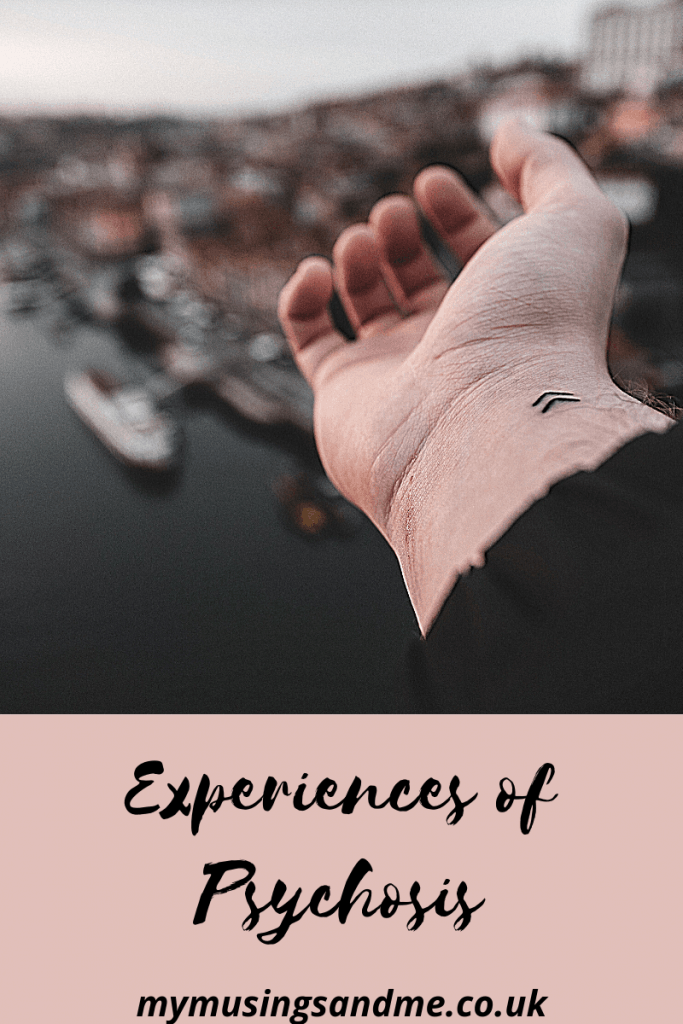This post on experiencing psychosis and hearing voices has been written by Joanna. To find out more about Joanna and her work please see below.
Please be aware that this post discusses experiences of psychosis and suicide. Please check in with yourself before reading this post and think about support networks you can use if need be.

Psychosis is losing contact with reality. This might involve seeing or hearing things that other people cannot see or hear (hallucinations) and believing things that are not actually true (delusions). Psychosis can mean many things to many people.
If you hear voices, see visions or have similar sensory experiences – you’re not alone. The statistics vary, but somewhere between 3 and 10% of the population have experiences like these (increasing to about 75% if you include one off experiences like hearing someone call your name out loud).
Psychosis & Hearing Voices
Despite being relatively common, many people who hear voices, see visions or have other perceptual disturbances feel alone. Fear of prejudice, discrimination, and being dismissed as ‘crazy’, ‘mental’, ‘mad’ and ‘dangerous’ keeps people silent. I experience hearing voices, tactile hallucinations (when you feel that you are being touched but aren’t really) and delusional thoughts. I hear voices regularly, the voices of three men and a young girl. My delusional thoughts have tended to be very religious in content. Out of the three experiences, the most annoying and distracting has been the sensation of something constantly touching the back of my head. It occurs more when I am feeling stressed.
People of all ages and backgrounds can hear voices at some point in their life, for many different reasons. Whilst some are distressed by their experiences, people can – and do – find ways of living with them. I listen to music, my favourite distraction being 90’s dance. Podcasts or audio books also work. I use grounding techniques or objects and sometimes even challenge the voices when they become too much. Medication has had also played its part, and whilst the voices remain, their intensity and occurrence has reduced.
Different strategies and medication can work. And sometimes it is a question of trial and error, until what works for you is found. Surpassing these, individual people have played the biggest part in my recovery. I worked with an amazing psychotherapist at the NHS who taught me how to understand them. Voices are there not to be endured but to be explored. I interpret my voices now as being alarm bells, they increase and become more vocal when I am stressed. A signal that I need to stop, slow down, consider what is happening in my world and take extra care of myself.
The Voices in My Head
I attended an Understanding Psychosis training at the NHS and a Ted talk was played. It was Dr. Eleanor Longden, ‘The Voices In My Head’. You can watch it here.
Dr Longden has completely changed how I understand and view my voices. Eleanor describes her journey from being hospitalized, drugged and written off, to being saved and returning to psychiatry; after gaining a doctorate in psychology. She repeatedly indicates that “the question in psychiatry shouldn’t be what is wrong with you but what happened to you”. This, is indeed, a more compassionate and empathic way of approaching the symptoms of mental distress. In relation to myself, I experienced childhood trauma which needed to be addressed, worked through and understood. I am now in therapy.

Dr Longden is part of the Hearing Voices Movement where she advocates for an alternative attitude to the experience of hearing voices than is usually found within mainstream psychiatric services. Rather than viewing voices as a fundamental sign of mental ill health, the movement suggests that while being unusual, they are ultimately understandable experiences that often relate to traumatic or problematic life events. It advocates for a more creative, person-centred approach to complex mental health issues. You can find out more about the Hearing Voices Movement here.
Personal Experience
The experiences I have talked about can be confusing and frightening. However, it’s not as simple as this, for some these experiences can be reassuring. Someone who feels lonely can hear a reassuring voice, others may also feel comforted if they feel a hand on their shoulder. They may interpret that their voice, that touch, as trying to support them.
My psychosis saved my life. I have battled with depression most of my adult life, at its worse I have needed hospitalisation. My lowest point was about five years ago. I was ready to take my own life. Then one morning, I awoke and believed I was a ghost. I remember sitting on the edge of my bed thinking my partner does not realise I am dead. This carried on for a few days until my mood lifted and the delusion faded. I realised how lucky I had been. For, you can’t really kill yourself when you are already dead. Something powerful within was keeping me alive through making me think and believe I was already dead.
Joanna works as a Peer Support Worker initially with the NHS, now with a mental health charity. She tries to move away from the medical model to a more compassionate, mutual and alternative world view. Joanna has run Hearing Voices Groups and use her lived experience of mental ill health to encourage, role model and empower those who she supports. She gets through life with the help and support of other survivors.


Thank you for being so brave, sharing your story and bringing awareness to the subject xx
http://www.dellalovesnutella.co.uk/